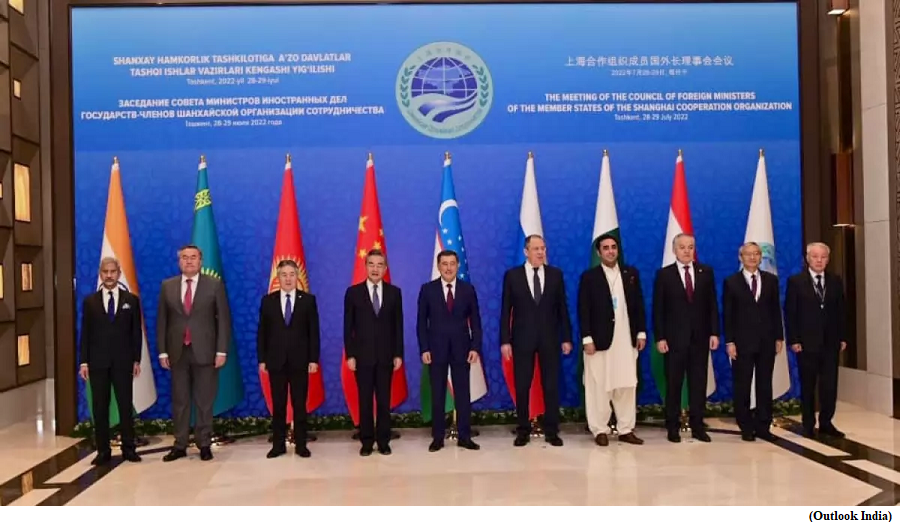Shanghai Cooperation Organisation meet in Goa (GS Paper 2, International Organisation)

Why in news?
- The Council of Foreign Ministers of the Shanghai Cooperation Organisation (SCO) will meet in Goa.
Member nations:
- The SCO is a multilateral grouping comprising eight member states of China, India, Kazakhstan, Kyrgyzstan, Russia, Pakistan, Tajikistan and Uzbekistan; four Observer States; and six “Dialogue Partners”.
- In 2023 of the four observers, Iran and Belarus are set to be admitted as full members. Afghanistan and Mongolia are the two other observers.
- The dialogue partners are Armenia, Azerbaijan, Cambodia, Nepal, Sri Lanka, and Turkey.
Foreign Ministers’ Meetings:
- India, which was admitted as a full member in 2017 along with Pakistan in the first-ever expansion of the group, holds the rotating presidency of the SCO in 2023, and in this capacity has hosted several ministerial-level SCO meetings, including a tourism ministers’ meeting at Varanasi in March.
- The main work of the foreign ministers’ meeting is to prepare for the upcoming meeting of the Heads of State Council, or the SCO summit, expected to be held in July.
- The foreign ministers will put their heads together to prepare a draft declaration to be adopted at the summit, formalise the admission of Iran and Belarus to the SCO, and discuss other regional and international issues.
- Like 2022, SCO meetings are being held under the shadow of Russia’s war in Ukraine, and the resultant geopolitical changes in the world.
Central Asia, the heart of SCO:
- Eurasia, which in the Organisation for Economic Co-operation and Development (OECD) definition includes 13 countries (Afghanistan, Armenia, Azerbaijan, Belarus, Georgia, Kazakhstan, Kyrgyzstan, Mongolia, Moldova, Tajikistan, Turkmenistan, Ukraine and Uzbekistan), is at the centre of this flux in the world order.
- Excluding Ukraine, Georgia, Moldova, and Turkmenistan, all others are either members, observers or dialogue partners of the SCO.
Russia vs China:
- While the West views the SCO as a cosy club run by China and ally Russia, those familiar with the workings of the group describe the forum as a venue where the two dominant powers are in competition with each other for influence.
- Four of the five Central Asian republics are members of SCO. Russia has viewed these resource-rich republics that were part of the erstwhile Soviet Union, as its strategic backyard.
- But it has not been able to stop a growing Chinese footprint over the region, which has been driven both by strategic economic and security reasons.
- The competition has been all the more apparent as China’s outreach to the Central Asian 5, or C5, caught momentum with the Belt and Road Initiative, and accelerated over the 2022 during Russia’s preoccupation with its war in Ukraine.
- In May 2023, China is preparing to host an in-person C Plus C5 summit, after 2022’s inaugural summit held virtually.
- But Russia’s continuing economic influence in the region is still strong, as are its political, cultural and people-to-people connections.
India & the SCO:
- Russia sees India’s presence in the SCO as a potential countervailing force to Chinese dominance of Central Asia.
- It was Russia that began pushing for India’s membership of the group, around the time that China’s Xi Jinping launched his Belt and Road Initiative in Kazakhstan. In 2015, India was admitted as an observer along with Iran and Pakistan.
- Prime Minister Narendra Modi’s visit in 2015 to all five central Asian republics in one trip gave India’s interest in the region an authoritative imprimatur.
- The region spoke to all the recurrent themes of Indian foreign policy over the last two decades – trade, connectivity, energy security and combating terrorism.
- A membership of the SCO gave India a higher profile in Central Asia to which it does not have overland access. In post-US Afghanistan, it has helped India stay involved in the regional discussion on Taliban rule, from which it is otherwise excluded.
Neighbouring Countries of Afghanistan:
- In April 2023, the foreign ministers of Pakistan, Iran, China, Russia, Tajikistan, Turkmenistan and Uzbekistan, which have formed a group called “Neighbouring Countries of Afghanistan”, met in the Uzbek city of Samarkand.
India’s diplomacy:
- Just as much as Russia needs India in the SCO, with relations between India and China rough since the Doklam episode in 2017 and worsening steadily after the Chinese incursions in eastern Ladakh, the group has provided Delhi a forum to play up its proximity to Russia.
- Some experts have tended to view the Quad grouping of Australia, India, Japan and the United States as a counter to the influence that Russia and China seek to project through the SCO, and India’s membership of both as an irreconcilable contradiction.
- But if the Quad is India’s diplomacy in the Indo-Pacific, the SCO represents its diplomacy in the Eurasian landmass. It can also be seen as an exercise of true multipolarity.
- If the SCO is a bipolar China-Russia platform, it offers several multipolarities within as other members leverage their strengths to get the best deal for themselves.
- At 2022’s foreign ministers’ meeting in Tashkent, India was the only country that did not sign a joint statement calling for the strengthening of the Biological Weapons Convention. The entry of Iran and Belarus can only increase the cross currents within.
Way Forward:
- SCO veterans describe the forum as a “diplomatic battlefield”.
- The challenge for India is to use both the SCO and the Quad to further its own interests instead of getting trapped in an either-or proposition.


